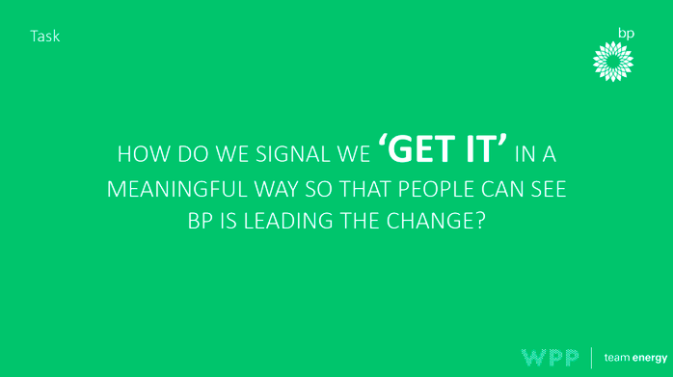WPP’s leaked BP marketing deck shows that you can’t fix looking like a ‘bad guy’ if you act like one
Earlier this year, WPP’s ‘Team Energy’ created a deck for BP to guide creative workshops. It asked questions like: ‘How do we signal we ‘get it’ in a meaningful way so people can see BP is leading the change?’ and ‘What is meaningful empathy in a world where we’re seen as one of the bad guys?’ Belinda Noble argues BP can’t answer those questions truthfully and adequately when they’re currently in opposition with its business model and profitability goals.
Recently, WPP’s marketing deck for client BP was leaked to climate media outfit, Drilled News. It’s very revealing, suggesting that the company may be manipulating community sentiment regarding climate change in order to sell more gas.
The deck – created by WPP’s ‘Team Energy’, which was formed in 2017 to manage BP’s account – was used as an introduction to a week of workshops attended by BP’s agencies and executives. The 52-page presentation contains nine pages on the challenge of reinventing BP to win over the next generation of customers, workers and opinion leaders.



How can you justifiably write, “you could easily feel a little bit sorry for BP”? They’re a literal stain on the Earth and do nothing but lie, steal and destroy.
“…equate gas with clean energy” – doesn’t this tells you everything you need to know about the organisation. Scum.
Good on the whistleblower.
I’ve seen plenty of similar packs in my time working in marketing at a bank. Lots of ‘we’re helping people get ahead’ when really it’s just stretching people’s credit beyond control. This BP example is fascinating though.
“HOW DO WE SIGNAL WE ‘GET IT’ IN A MEANINGFUL WAY?”
Based on page 12…
“How we run our business:
1) Finding oil and gas
2) Developing and extracting oil and gas”
… you can’t. Not without causing yourself cognitive dissonance so intense your brain will melt. To anyone involved with trying to help BP create this ‘signal’ – please just stop. Have some integrity and respect for yourself and, more importantly, the rest of humanity.
“HOW DO WE SIGNAL WE ‘GET IT’ IN A MEANINGFUL WAY?”
Set a target to halve your emissions in the next ten years and demonstrate you have a credible plan to achieve it. Until then you DON’T actually get it – and the world knows it.
What a difference a decade makes:
2010 BP CEO Tony Hayward – “I want my life back”
2020 BP Marketing – “Please can we have our deck back?”